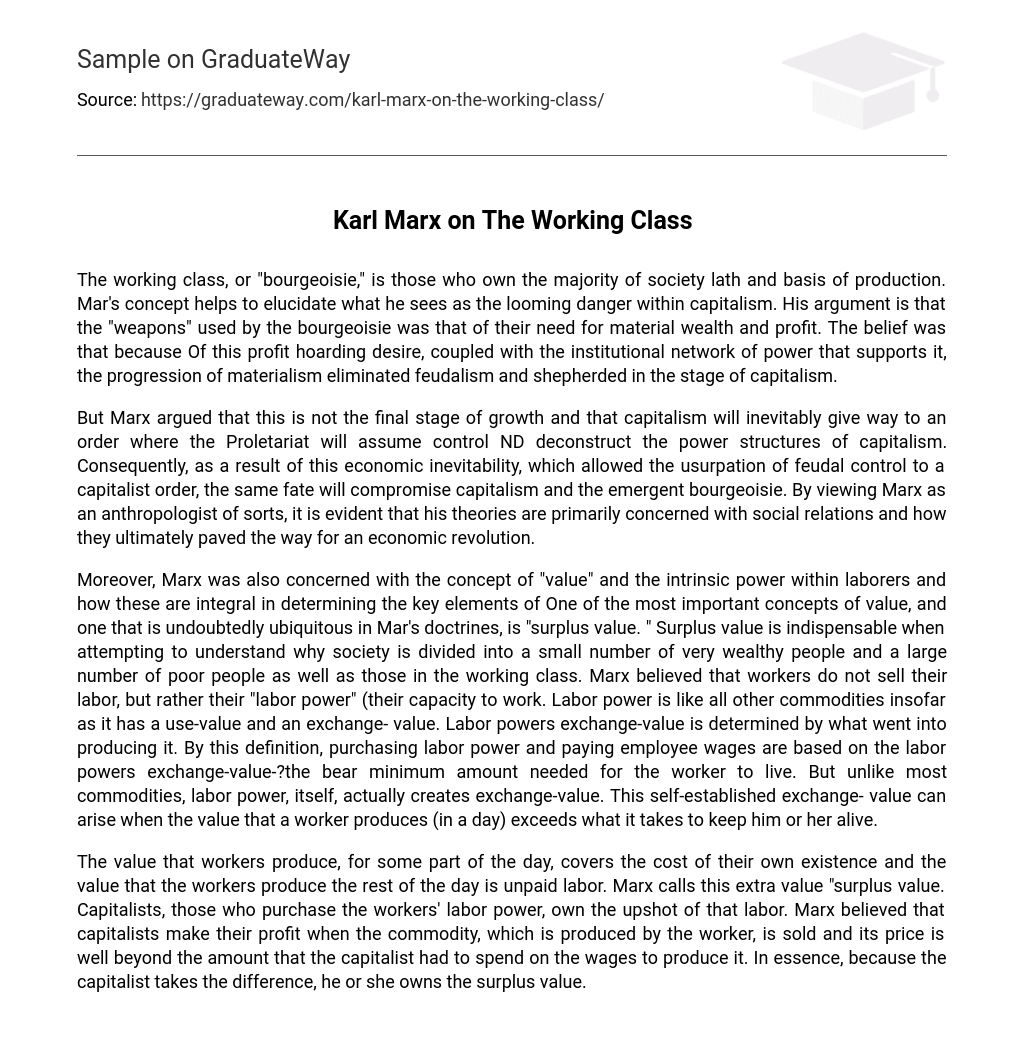The working class, or “bourgeoisie,” is those who own the majority of society lath and basis of production. Mar’s concept helps to elucidate what he sees as the looming danger within capitalism. His argument is that the “weapons” used by the bourgeoisie was that of their need for material wealth and profit. The belief was that because Of this profit hoarding desire, coupled with the institutional network of power that supports it, the progression of materialism eliminated feudalism and shepherded in the stage of capitalism.
But Marx argued that this is not the final stage of growth and that capitalism will inevitably give way to an order where the Proletariat will assume control ND deconstruct the power structures of capitalism. Consequently, as a result of this economic inevitability, which allowed the usurpation of feudal control to a capitalist order, the same fate will compromise capitalism and the emergent bourgeoisie. By viewing Marx as an anthropologist of sorts, it is evident that his theories are primarily concerned with social relations and how they ultimately paved the way for an economic revolution.
Moreover, Marx was also concerned with the concept of “value” and the intrinsic power within laborers and how these are integral in determining the key elements of One of the most important concepts of value, and one that is undoubtedly ubiquitous in Mar’s doctrines, is “surplus value. ” Surplus value is indispensable when attempting to understand why society is divided into a small number of very wealthy people and a large number of poor people as well as those in the working class. Marx believed that workers do not sell their labor, but rather their “labor power” (their capacity to work. Labor power is like all other commodities insofar as it has a use-value and an exchange- value. Labor powers exchange-value is determined by what went into producing it. By this definition, purchasing labor power and paying employee wages are based on the labor powers exchange-value-?the bear minimum amount needed for the worker to live. But unlike most commodities, labor power, itself, actually creates exchange-value. This self-established exchange- value can arise when the value that a worker produces (in a day) exceeds what it takes to keep him or her alive.
The value that workers produce, for some part of the day, covers the cost of their own existence and the value that the workers produce the rest of the day is unpaid labor. Marx calls this extra value “surplus value. Capitalists, those who purchase the workers’ labor power, own the upshot of that labor. Marx believed that capitalists make their profit when the commodity, which is produced by the worker, is sold and its price is well beyond the amount that the capitalist had to spend on the wages to produce it. In essence, because the capitalist takes the difference, he or she owns the surplus value.
Marx sees this as a basic inequality built into capitalist society; labor power’s use-value is that it earns the capitalist a profit. By allowing a class of owners to control the surplus value created by the errors, there will inevitably be tremendous economic disparity. It can be inferred that a Marxist society aspires to eradicate the right of a capitalist class to privately own the surplus value that is created by the workers. Rather than serving private gain, the populace’s surplus would service the majority-?those who produce it.
Additionally, it is for this same reason (of wanting to bridge the economical gap) that Marx inevitably put tremendous faith in the prospects of the working class and their revolutionary potential. Marx believed that there is inherently something wrong with a society that sews wealth as the be-all and end-all of achieving success. Although he did put tremendous faith in the prospects for the working class, he felt that capitalist society forces those laborers to form a coalition and go against the dominant order.
The term “industrial reserve army” refers to the unemployed (and presumably under-employed) laborers in capitalist society. These individuals are an army because they are enlisted in the workplace in a hierarchy, controlled by the capitalists. Marx felt there are no salient laws of population that transcend time and therefore each “mode of production” has TTS own relative laws. Demographics cannot be relied on in capitalist society because the numbers are relative.
The numbers need to take into account the social relations between the people and cannot simply count them, again showing how Marx is very much concerned with the anthropological aspects of society. For example, if there’s overpopulation in a capitalist society, it’s overpopulation relative to the necessities of capital accumulation. Mar’s argument is that fewer workers can produce all that is necessary in a capitalist society and as a result, capital will more often be concentrated in less people. Inevitably, part of the working class population will become surplus to the needs of capital accumulation.
It would seem that the wealth ire the society is, the larger the industrial reserve army will become. As a result of the notion of an industrial reserve army, Marx shows that the evolution of a society relies on the majority of those fueling the economy, the working class. Furthermore, the revolutionary side of this army is that because it (the laborers) comprises those who will or would make the goods and provide the services, they have the capacity to evolve the economical dynamic of a society ND augment the distribution Of power.
This shows how Marx saw great prospects for the working class by showing the power that they potentially have. In retrospect, Mar’s doctrines are nothing short of a pipe dream, but they do have their merits. He opined that economics is the base structure of society and how history serves as evidence for the inevitability of evolution. Additionally, he showed how the working class fueled the economical revolution of history and how the bourgeoisie, surplus value, and industrial reserve army served as evidence of this notion.





